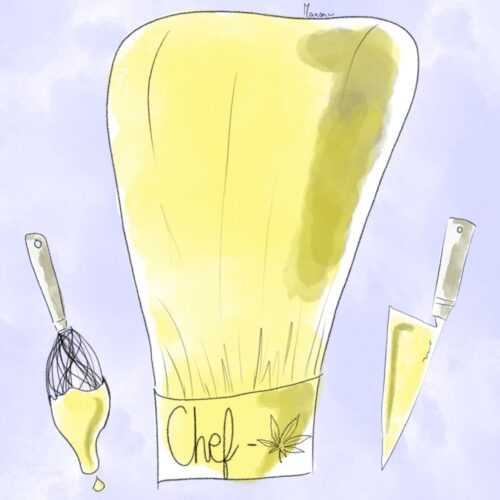Now we’re cooking! More Cannabis Course Offerings this Spring
By Eleni Balakrishnan
ebalakri@mail.ccsf.edu
This spring, students can indulge the munchies and learn cannabis culinary skills from their own kitchens alongside celebrated chefs, as City College expands its offerings in cannabis academia.
City Extension will offer various new workshops, including a culinary course, which will teach students about infusing cannabis into their cooking materials, the basics of dosing, as well as the historical and cultural context of cannabis use. In line with City College’s aim to ensure the entire Cannabis Studies program keeps a focus on social equity and the political history of marijuana in the United States, the three instructors for the course are chefs of color with international roots and intentions to teach in context.
New York chef Miguel Trinidad, whose cookbook was nominated for a James Beard award, will teach students how to microdose cannabis in their food. He plans to show that cannabis can be incorporated in any cuisine, in any culture, and hopes to ease negative associations people have with edibles.
“I hate to put myself in a box,” said Trinidad, who is Dominican, was raised in New York, and worked extensively in Filipino cuisine. “[Cannabis] can be breakfast, lunch, or dinner. It can be savory or sweet.”
Cannabis has long had a history of stigmatization, and Trinidad will incorporate new research into his class for skeptics who, like his mother, still see cannabis as “the devil’s lettuce.”
“It’s not all about getting high,” Trinidad said. He expects that with legalization and further research, people will start to accept cannabis as a legitimate alternative to pharmaceuticals when it’s prescribed by a doctor.
Another of the instructors, also an infusion expert and the author of “The Art of Weed Butter,” Chef Mennlay Aggrey agrees that cannabis knowledge can be applied beyond recreation. The techniques she’ll teach can be applied when infusing other herbs, and the course will be catered to cannabis enthusiasts and those interested in culinary arts alike. What’s more, Aggrey said, cannabis can help with anything from muscle relaxation to skin and haircare, though she is wary of claiming any medicinal benefits due to her experiences with the FDA.
Dean of Behavioral Sciences Dr. Jennifer Dagwert-Carlin, who developed the Cannabis Studies AA program, said the curriculum for all extension courses is being reviewed to ensure the program teaches only what has been substantiated by research.
“We have real rigor around the curriculum,” Dagwert-Carlin said. “So we feel very strongly that our program will be grounded in the current science, as it evolves.”
Like Trinidad, Aggrey comes from a multicultural background and plans to pass on her 15 years of cannabis expertise in course she has tentatively titled “From West Africa to Mexico: Botanical and Culinary Ties to the Diaspora.”
Finally, Chef Amanda Jackson, who hails from rural Georgia will “explore the historical roots – and intersectionality – of southern cooking and marijuana, both of which are deeply rooted in Black culture,” according to a media relations press release. Jackson and her cooking were featured in Netflix’s show Cooked with Cannabis.

The new culinary course is one of several new cannabis-related not-for-credit workshops available through City Extension, and range in length from a few hours to a few weeks.
Meanwhile, for those seeking a degree, the Cannabis Studies AA program announced in July that it will launch two of its required courses for the first time in the Spring 2021 semester.
Students can earn a “badge” in manufacturing, public education, social equity, or business and finance once they have completed Cannabis 101 and three City Extension workshops in that area. While they are not for college credit, the badges “will be recognized by the Bay Area cannabis industry as an indicator of expertise in the field,” the media relations press release said.
“The extension is kind of like an incubator for what could develop into for-credit courses at City College,” said Dr. Dagwert-Carlin. The culinary course will not contribute to a certificate or badge, but students can learn cooking skills and get to know their own kitchens, she said.
